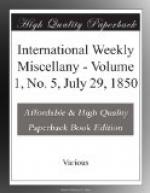thus persuaded and enabled to escape on board a vessel
with her lover, with the view of ending her days with
him in France. In their hurry and alarm they
embarked without the pilot, and the season of the year
being the most unfavorable, were soon at the mercy
of a dreadful storm. The desired port was missed
during the night, and the vessel driven out to sea.
After twelve days of suffering they discovered faint
traces of land in the horizon, and succeeded in making
the spot still called Machico. The exhausted
Anna was conveyed on shore, and Machim had spent three
days in exploring in the neighborhood with his friends,
when the vessel, which they had left in charge of the
mariners, broke from her moorings in a storm and was
wrecked on the coast of Morocco, where the crew were
made slaves. Anna became dumb with sorrow, and
expired three days after. Machim survived her
but five days, enjoining his companions to bury him
in the same grave, under the venerable cedar, where
they had a few days before erected a cross in acknowledgment
of their happy deliverance. An inscription, composed
by Machim, was carved on the cross, with the request
that the next Christian who might chance to visit
the spot would erect a church there. Having performed
this last sad duty, the survivors fitted out the boat,
which they had drawn ashore on their landing, and putting
to sea in the hope of reaching some part of Europe,
were also driven on the coast of Morocco, and rejoined
their companions, but in slavery. Zargo, during
an expedition of discovery to the coast of Africa,
took a Spanish vessel with redeemed captives, amongst
whom was an experienced pilot, named Morales, who
entered into the service of Zargo, and gave him an
account of the adventures of Machim, as communicated
to him by the English captives, and of the landmarks
and situations of the newly-discovered island.—
Madeira,
by Dr. Mason.
* * * *
*
Centenary Performances in commemoration of the death-day
of John Sebastian Bach—the 28th of July—are
this week to be held at Leipsic, (where an assemblage
of two thousand executants is to be convened for the
display of some of the masters greatest works,) at
Berlin, at Magdeburg, at Hamburg, and at other towns
in North Germany.
* * * *
*
[FROM THE LEADER.]
POETS IN PARLIAMENT.
The prominence which the “winged words”
of Victor Hugo have recently given him in the Assembly
has called forth sarcastic insinuations and bitter
diatribes from all the Conservative journals.
There seems to be an intensity of exasperation, arising
from the ancient prejudice against poets. A poet
treating of politics! Let him keep to rhymes,
and leave the serious business of life to us practical
men, sober-minded men—men not led away
by our imaginations—men not moved to absurdities
by sentiment—solid, sensible, moderate men!
Let him play with capricious hand on the chords which
are resonant to his will; but let him not mistake
his frivolous accomplishment for the power to play
upon the world’s great harp, drawing from its
grander chords the large responses of more solemn
themes. Let him “strike the light guitar”
as long as women will listen, or fools applaud.
But politics is another sphere; into that he can only
pass to make himself ridiculous.




